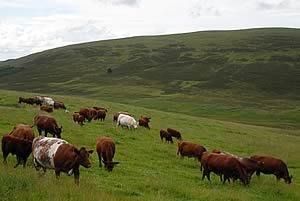24/10/07
The National Beef Association would like new Food Standards Agency
(FSA) revisions to improve consumer guidance through clear food
labelling to include strong advice on the display of similarly
packaged products from different countries of origin.
It is pleased that the FSA has included improvement to country
of origin labelling among the proposals in its new consultation
on developments needed to ensure clear food labelling for consumers – which
was opened earlier this month. (October 1st)
But is worried that the Agency appears not to think that questionable display
techniques, as well as poor labelling, must also be covered if it is to be sure
consumers are not being misled about the true origin of their food when they
are making a purchase.
“It is obvious that the FSA wishes to make it more difficult for retailers,
or manufacturers, to mislead consumers about country of origin because it has
recommended that particulars about the place of origin must be included on the
label if failure to do so might mislead the purchaser to a material degree,” explained
NBA director, Kim Haywood.
“However the NBA is very well aware that fresh beef from different countries
is labelled by supermarkets in a similar way, that this beef is not clearly separated
by country of origin on supermarket shelves, and as a result many consumers pick
up packs of beef from the wrong country by mistake.”
“This being the case the Association will argue very strongly that many
disappointed consumers are routinely misled by poor country of origin display,
otherwise known as co-mingling, and that the FSA will fall short of its own high
standards if it continues to concentrate exclusively on labelling as a means
of reducing confusion created by poor country of origin identification.
According to the NBA supermarkets routinely offer beef packages, especially steak
and value meal offers, that have to be examined extremely carefully before country
of origin is identified on the label.
And many consumers, who have a clear preference for home produced, British, are
also deceived into picking up imported beef, because British beef is not physically
separated from packs of Irish or South American beef which look almost exactly
the same.
“Legislation under Article 16 of EU regulation 178/2002 clearly indicates
that there must be no country of origin confusion in retail labelling or display,” said
Ms Haywood.
“Unfortunately supermarkets, for their own reasons, continue to ignore
Trading Standards advice that beef from different countries of origin should
be physically separated by at least a plastic strip and identification of country
of origin should be reinforced by prominent shelf edge signage.”
“The NBA would like the FSA to reinforce EU legislation by advising that
beef from different countries of origin should be in differently coloured packs
with colour coded labels and that beef from different countries of origin must
be physically separated too.”
“There is clear popular backing for the latter. Late last year over 100
MPs signed an Early Day Motion calling for the physical separation of retail
beef from different countries and consumers regularly complain to us that they
want to buy home produced beef but when they got home found they had picked up
imported beef instead.”
“If an organisation of the FSA’s standing was able to take a stronger
position on country of origin which reduced confusion by covering display (co-mingling)
as well as product labelling it would, without doubt, help to reduce the number
of purchasers that are currently being misled to a material degree,” Ms
Haywood added.
 Autumn Lamb Takes Centre Stage In New Vodcasts Autumn Lamb Takes Centre Stage In New Vodcasts
 Consumer Insight into Scottish Farmers and Food Producers Consumer Insight into Scottish Farmers and Food Producers
 Country Fare Thrives on Local Sourcing Country Fare Thrives on Local Sourcing |




